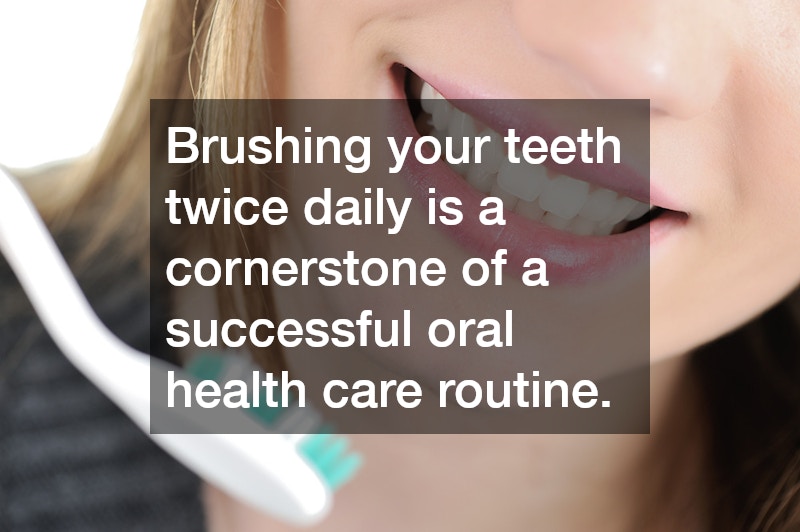Oral health often mirrors the overall well-being of an individual. A robust oral health care routine not only contributes to a radiant smile but also prevents complex dental issues. Here, we explore essential components to include in your daily regimen and emphasize the importance of regular dental visits.
Brushing Techniques and Importance
Brushing your teeth twice daily is a cornerstone of a successful oral health care routine. Using a soft-bristled toothbrush and fluoride toothpaste can help remove plaque, which is a sticky film of bacteria that causes tooth decay and gum disease.
Proper brushing should last for at least two minutes, ensuring all surfaces of the teeth are cleaned effectively.
The dentist often stresses the importance of correct brushing techniques to prevent common oral health issues. Angling the toothbrush at a 45-degree angle towards the gums can help dislodge plaque at the gum line. By dividing the mouth into quadrants, you can ensure that each section receives adequate attention during your oral care routine.
Besides technique, replacing your toothbrush every three to four months or sooner if the bristles are frayed is crucial. Worn-out bristles are less effective in cleaning teeth and can lead to ineffective plaque removal. Your dentist may recommend an electric toothbrush for more thorough cleaning, particularly if manual dexterity is a challenge.
Flossing to Complement Brushing
Flossing is an indispensable part of maintaining oral hygiene that complements brushing. It removes food particles and plaque from areas that a toothbrush might miss, such as between teeth and under the gumline. Daily flossing can significantly reduce the risk of developing cavities and periodontal disease.
Your dentist can guide you in choosing the appropriate type of floss and demonstrate the correct technique for effective cleaning. Correct flossing involves gently sliding the floss between the teeth and curving it along the sides of each tooth. This helps ensure that you are cleaning the entire surface area, even under the gumline.
Both floss picks and traditional string floss have their advantages, allowing customization of your routine to fit your needs. The habit of flossing every day instills a proactive attitude towards oral care, encouraging the prevention of dental problems before they occur. Discussing flossing habits with your dentist can help refine your technique over time.
The Role of Mouthwash
Mouthwash is more than just a breath freshener; it plays a critical role in an effective oral health care routine. Therapeutic mouthwashes can help reduce or control plaque, gingivitis, bad breath, and tooth decay. Incorporating mouthwash into your daily regimen can offer benefits beyond those of brushing and flossing alone.
It’s essential to select a mouthwash that meets your specific oral health needs. A dentist may recommend a mouthwash with antibacterial properties if you’re prone to gum disease, or a fluoride mouthwash to strengthen enamel. Swishing with mouthwash for about 30 seconds to a minute allows the active ingredients to work effectively.
While mouthwash should not replace brushing and flossing, it can complement these efforts by reaching areas of the mouth that might be missed by other methods. Certain mouthwashes can also help alleviate tooth sensitivity by forming a protective layer over sensitive areas. Regular consultation with your dentist ensures that your choice of mouthwash aligns with your oral health goals.
Regular Dental Check-Ups
Visiting your dentist at least twice a year is a fundamental component of a successful oral health care routine. Regular check-ups allow for early detection of potential issues, ultimately leading to more conservative and less invasive treatment options. Dental professionals can conduct thorough cleanings, removing tartar that is not easily removed by brushing or flossing alone.
Beyond cleanings and assessments, dentists provide education on maintaining an effective oral health care routine tailored to your needs. They are instrumental in diagnosing any changes or concerns in your oral health, providing timely interventions. Regular visits also help build a trusted relationship, enabling comfortable communication about oral health concerns.
Consistent dental appointments reinforce good oral habits and ensure personalized attention to your dental history and lifestyle. These visits empower patients with updates on the latest in dental care technology and practices. Understanding the long-term importance of professional dental care solidifies these visits as a priority in your routine.
A well-rounded oral health care routine is more than just a step towards a brighter smile; it’s a crucial element of general health. Brushing, flossing, and using mouthwash provide a solid foundation, but regular dental visits are indispensable for maintaining optimal oral health. By integrating these components into your daily life, you can enhance your dental health and overall well-being.



